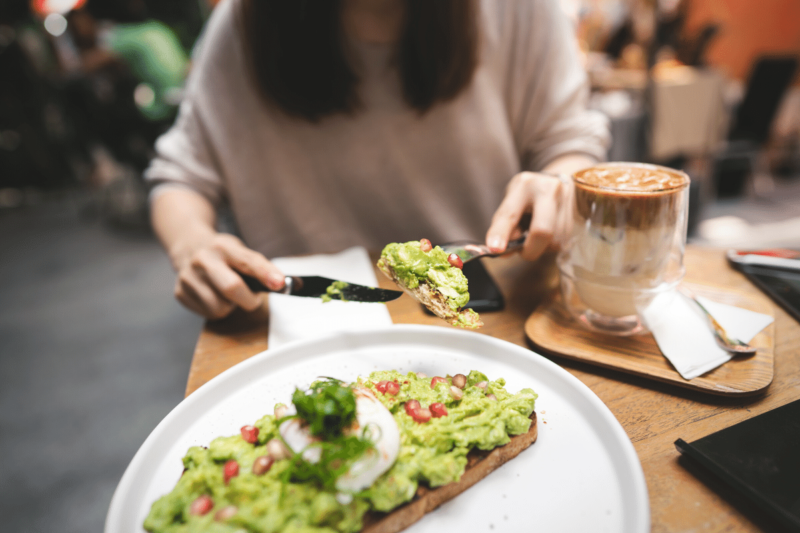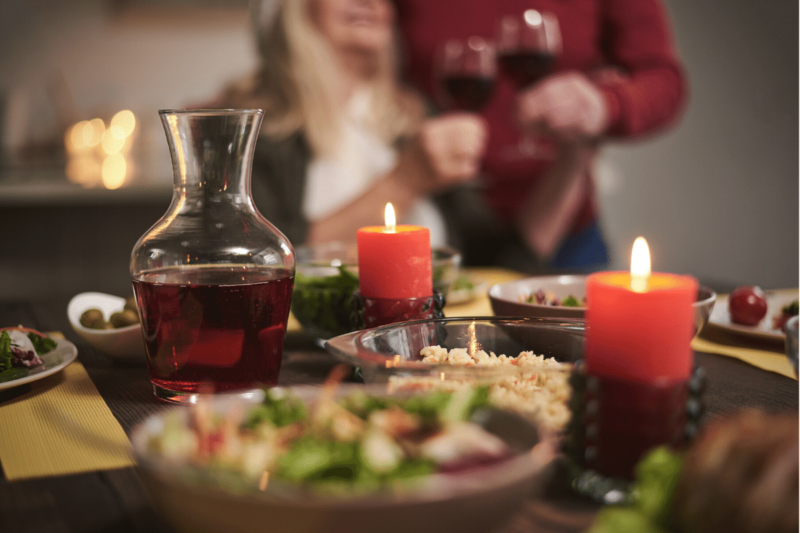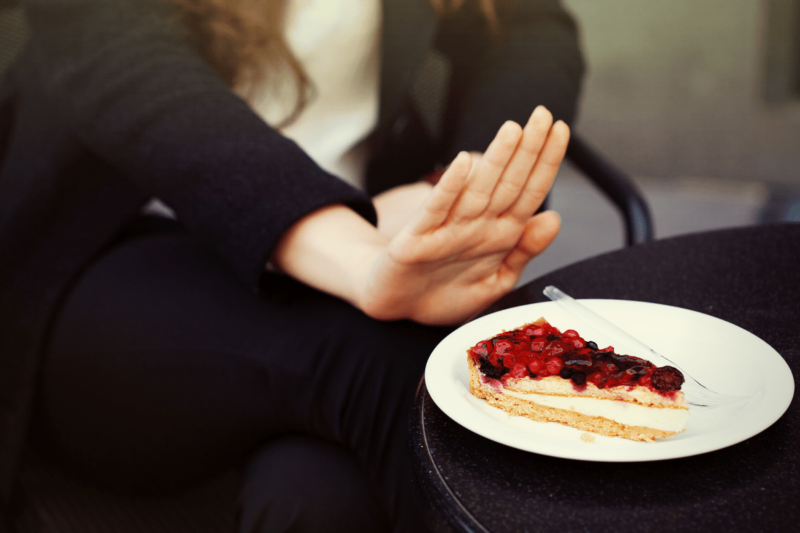If you already tend to have anxiety about food — maybe you have a history of dieting or eating disorders, or you’re just dealing with emotional or stressful eating habits — the holiday food environment can make you especially anxious. Overindulgence, whether real or perceived, can lead to guilt, regret, and possibly a vicious cycle of restriction and binge eating.
Complicating matters is the fact that in many parts of the country the holidays are accompanied by shorter daylight hours and the kind of weather that contributes to bad moods and creates barriers to physical activity. Here’s some food for thought on how to approach holiday food that brings you joy and makes you feel good.

Nourish your body and tend your hunger
The holiday season is supposed to be joyful, but it can also be stressful, with overloaded schedules and numerous social obligations. Chaotic days often lead to chaotic eating, which can mean overeating, undereating, or mindless eating.
Being very hungry leaves you vulnerable to eating sugary, high-calorie foods, in part because hunger is a response to low blood sugar levels—your body is literally crying out for fuel. Eating well by eating regular meals and snacks (every 3-5 hours, depending on your individual needs) will prevent you from getting overly hungry and reaching for sugar cookies.
Plan ahead so you have nutritious foods at home or know where you can grab a nutritious meal while out shopping. This will make you feel much better than surviving on lower nutrient foods. Who wants to spend the holidays feeling lazy?
It’s also important to tend to your hunger in other ways. Trying to compensate for “overeating” at dinner by skipping breakfast the next morning can backfire as you’ll be extremely hungry later that day. Similarly, “saving resources” for a special dinner by eating next to nothing for breakfast or lunch can lead to uncomfortably fullness at that dinner. If you’re hungry, you deserve to eat, and we tend to enjoy our food more when we’re mildly, not ravenously, hungry.

Nurture your emotions and practice self-care
The holiday season brings both stress and joy and it can be loaded with impulses for emotional or comfort food — and sometimes overeating. While there’s nothing wrong with using food to soothe sometimes, it shouldn’t be yours only way of coping.
Because family dynamics can add fuel to the emotional fire, now is a great time Take stock of the tools in your toolbox for emotional coping strategies. The more you can use food for nourishment and pleasure—and avoid using it to cope with stress or emotions that the holidays may bring up—the better you’ll feel in the end.
- If they exist certain rituals or activities that help you stay healthy — morning yoga, daily walk, some quiet time alone to read or just is — set some personal boundaries to protect that time during the busy holiday season.
- When you feel yourself in the grip of anxiety or strong and uncomfortable emotions, ask yourself, “What I am I feel?” You may know that you feel “bad,” but do you specifically feel sad? Anxious? Stressed? Misunderstood? Canceled? Being able to name what you feel can reduce some of the power of the emotionand let’s…
- …ask yourself, “What do I need?” What would help you feel less sad, less anxious, more validated? It may be useful to make a list of activities in advance which you can use in a pinch to lift your spirits, calm your anxiety or simply distract yourself. For example, call a friend, watch a favorite movie, listen to music, meditate, take a bath, pet your dog or cat, get out of the house. If you know a particular meal will be stressful, bookend it with one or more of these activities.

Be curious and eat carefully
When you’re about to look for food, ask yourself, “Am I hungry?” and “Is this what I really want to eat now?” If the answer to either is “No”, consider reconsidering. At the very least, asking yourself these two questions gives you a moment to make a conscious decision, rather than acting on autopilot. When you eat, pay attention. Eating mindfully helps you make better, more satisfying food choices — and enjoy them to the fullest.
If you often feel overwhelmed at the end of holiday meals, perhaps because you don’t want the deliciousness to end, or because you’re eating to soothe family squabbles or social awkwardness, ask yourself this question before you start eating: “How do I want to feel when I get up from the table? Comfortably full and satisfied or uncomfortably full and in need of a nap?”
Step a may be useful mental dress rehearsal. Imagine yourself choosing foods that taste good and feel good about your body. Imagine yourself carefully enjoying them and walking away feeling satisfied, not full.
Then when you actually eat, try to stay tuned to the sensory aspects of your food as you eat — taste, texture, temperature and aroma — as well as signs that you are full. Allowing yourself maximum pleasure can make it easier to say “enough.”

Set food limits
Rehearsals are also helpful in dealing with wholesome foods, especially if you have people-pleasing tendencies. Imagine yourself politely but firmly refusing food you don’t want, no matter how well-intentioned the offer. To prevent pushing food without stepping on toes, start with a compliment and finish with a distortion, such as “Mmmm… that looks delicious. I’m not hungry right now, but I will be later” or “The food was so delicious… I literally couldn’t eat another bite”. Most people who push food are trying to be a good host—or looking for validation of their culinary skills—but the end result is the same if you end up eating food you don’t need or want.
Carrie Dennett, MPH, RDN, is a registered dietitian nutritionist based in the Pacific Northwest, freelance writer, intuitive nutrition consultant, author, and speaker. Her superpowers include; debunking nutritional myths and empowerment of women feel better about their bodies and make food choices that support pleasure, nutrition and health. This post is for informational purposes only and does not constitute personalized nutrition or medical advice.
Looking for 1 on 1 nutritional advice? Carrie offers a 6-month Food & Body program (intuitive eating, body image, awareness, self-compassion) and a 4 month IBS management program (How-FODMAP diet coaching with an emphasis on increasing food freedom). Visit the links to learn more and book a free introductory call to see if the program is a good fit and if we’re a good fit!
![]() Print this post
Print this post
